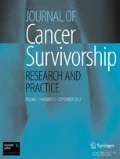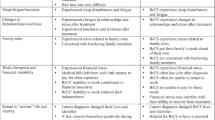Abstract
Background
The number of cancer survivors is increasing dramatically. Many survivors report long-term psychosocial, physical and other consequences. To understand the issues faced by Australian cancer survivors we conducted focus groups with cancer patients and health professionals.
Methods
Patients were identified through a peer support program at a major cancer treatment center (Peter Mac). Health professionals were also recruited from Peter Mac. Focus groups followed a semi-structured format based on themes identified from the literature. Questions focused on treatment completion, and 1 year post-treatment. Participants were also asked to suggest solutions to address identified issues. Focus groups were taped, transcribed, cross-checked for accuracy, and analyzed independently.
Results
The most common needs (in terms of both frequency and intensity) reported at treatment completion by both survivors and professionals were dealing with fatigue, anxiety about cancer recurrence, others expecting you to be back to normal, having to create new expectations about physical ability, and anxiety about leaving the hospital system. The most common needs at 1 year were anxiety about check-ups and results, and going into early menopause. The most frequently suggested ways of meeting these perceived needs were reassuring survivors the way they feel is normal and putting them in contact with others who have been through the same experience.
Discussion
There was a high level of congruence in the themes identified by survivors and health professionals.
Implications for cancer survivors
These results provide a clear direction for the development of resources to support cancer survivors following treatment completion.
Similar content being viewed by others
References
Australian Institute of Health and Welfare (AIHW) and Australasian Association of Cancer Registries (AACR). Cancer in Australia 2001. (AIHW cat. No. CAN 23) AIHW: Canberra (Cancer Services no. 28), 2004.
Institute of Medicine and National Research Council of the National Academies. From cancer patient to cancer survivor: Lost in transition. Washington: National Academy Press; 2006.
Cancer Survival: England and Wales, 1991–2001. Available from URL: http://www.statistics.gov.uk/statbase/ssdataset.asp?vlnk=7091 [accessed 1 November 2007].
National Coalition for Cancer Survivorship. Available from URL: http://www.canceradvocacy.org [accessed 1 November 2007].
Bloom JR. Surviving and thriving? Psychooncology 2002;11(2):89–92.
Loescher LJ, Welch-McCaffrey D, Leigh SA, et al. Surviving adult cancers. Part 1: Physiologic effects. Ann Intern Med. 1989;111(5):411–32.
Welch-McCaffrey D, Hoffman B, Leigh SA, et al. Surviving adult cancers. Part 2: Psychosocial implications. Ann Intern Med. 1989;111(6):517–24.
Lee-Jones C, Humphris G, Dixon R, Hatcher MB. Fear of cancer recurrence—a literature review and proposed cognitive formulation to explain exacerbation of recurrence fears. Psychooncology 1997;6(2):95–105.
Thomas SF, Glynne-Jones R, Chait I, Marks DF. Anxiety in long-term cancer survivors influences the acceptability of planned discharge from follow-up. Psychooncology 1997;6(3):190–6.
Holland JC, Reznik I. Pathways for psychosocial care of cancer survivors. Cancer 2005;104(11 Suppl):2624–37.
Massie MJ. Prevalence of depression in patients with cancer. J Natl Cancer Inst Monogr 2004;2004(32):57–71.
Weiss T. Correlates of posttraumatic growth in husbands of breast cancer survivors. Psychooncology 2004;13(4):260–8.
Short PF, Vasey JJ, Belue R. Work disability associated with cancer survivorship and other chronic conditions. Psychooncology 2007;17(1):91–7.
Short PF, Vasey JJ, Tunceli K. Employment pathways in a large cohort of adult cancer survivors. Cancer 2005;103(6):1292–301.
Schag CA, Ganz PA, Wing DS, et al. Quality of life in adult survivors of lung, colon and prostate cancer. Qual Life Res. 1994;3(2):127–41.
Northouse LL, Templin T, Mood D, Oberst M. Couples’ adjustment to breast cancer and benign breast disease: a longitudinal analysis. Psychooncology 1998;7(1):37–48.
Dorval M, Guay S, Mondor M, et al. Couples who get closer after breast cancer: frequency and predictors in a prospective investigation. J Clin Oncol. 2005;23(15):3588–96.
Couper J, Bloch S, Love A, et al. Psychosocial adjustment of female partners of men with prostate cancer: a review of the literature. Psychooncology 2006;15(11):937–53.
Couper JW, Bloch S, Love A, et al. The psychosocial impact of prostate cancer on patients and their partners. Med J Aust. 2006;185(8):428–32.
Andersen BL, Anderson B, deProsse C. Controlled prospective longitudinal study of women with cancer: I. Sexual functioning outcomes. J Consult Clin Psychol. 1989;57(6):683–91.
Maduro JH, Pras E, Willemse PH, de Vries EG. Acute and long-term toxicity following radiotherapy alone or in combination with chemotherapy for locally advanced cervical cancer. Cancer Treat Rev. 2003;29(6):471–88.
Penson DF, Feng Z, Kuniyuki A, et al. General quality of life 2 years following treatment for prostate cancer: what influences outcomes? Results from the prostate cancer outcomes study. J Clin Oncol. 2003;21(6):1147–54.
Ganz PA, Rowland JH, Desmond K, et al. Life after breast cancer: understanding women’s health-related quality of life and sexual functioning. J Clin Oncol. 1998;16(2):501–14.
Karahalios A, Baravelli C, Carey M, et al. An audiovisual information resource to assist in the transition from completion of potentially curative treatment for cancer through to survivorship: A systematic development process. J Cancer Surviv. 2007;1(3):226–36.
Schofield P, Carey M, Bonevski B, Sanson-Fisher R. Barriers to the provision of evidence-based psychosocial care in oncology. Psychooncology 2006;15(10):863–72.
Chelf JH, Agre P, Axelrod A, et al. Cancer-related patient education: an overview of the last decade of evaluation and research. Oncol Nurs Forum. 2001;28(7):1139–47.
McPherson CJ, Higginson IJ, Hearn J. Effective methods of giving information in cancer: a systematic literature review of randomized controlled trials. J Public Health Med. 2001;23(3):227–34.
Fitch M. Supportive care for cancer patients. Hosp Q. 2000;3(4):39–46.
Acknowledgments
The Peter MacCallum Cancer Foundation provided funding for this work. We wish to thank Professor Rob Sanson-Fisher and Ms Tara Clinton-McHarg for assistance with qualitative analysis. Finally, we would like to thank the cancer survivors and health professionals who assisted with this work.
Author information
Authors and Affiliations
Corresponding author
Rights and permissions
About this article
Cite this article
Jefford, M., Karahalios, E., Pollard, A. et al. Survivorship issues following treatment completion—results from focus groups with Australian cancer survivors and health professionals. J Cancer Surviv 2, 20–32 (2008). https://doi.org/10.1007/s11764-008-0043-4
Received:
Accepted:
Published:
Issue Date:
DOI: https://doi.org/10.1007/s11764-008-0043-4



